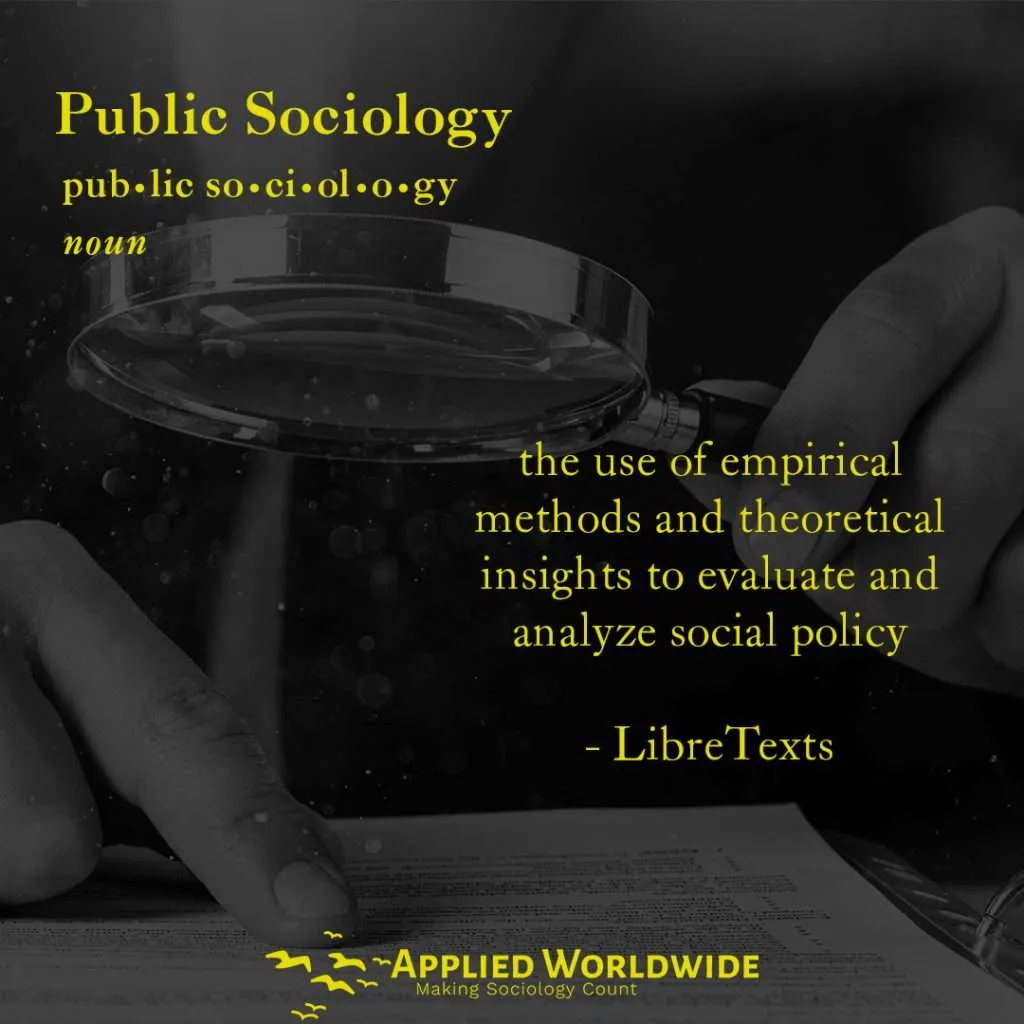Asking students to build a website as a public sociology assignment: an alternative to term papers.
In the spring of 2019, I taught an introduction to sociology course with 45 students. For this particular course, I implemented a final public sociology assignment in which I asked students to negotiate and design their own final projects worth the equivalent to a quarter of their overall course grade.

You can read more about my student-negotiated term assignment here, but ultimately these were final group projects where students chose between writing an academic research paper, proposing an applied client-based research project, or building a website in the name of public sociology. When given the choice to self-select into project-types, the groups split relatively evenly, but I want to elaborate on the three student groups who chose to build websites.
Instructions for the Public Sociology Assignment
As we were negotiating our final projects one of the first steps was to establish grading standards. For the public sociology website projects, students were to be graded along four criteria:
- content,
- strategy document,
- class presentation, and
- peer review.
Content for the Website
The actual content that students wrote and created was worth 60% of the total project grade. I asked the groups to write a minimum of 3,000 words of sociological content. My suggestion to students was each group member write 2-3 short analytical blogs, but I left the final decision up to the group on how they divided the labor.
Website Strategy Document
In addition to writing content about sociology, I tasked each group with producing a 2-5-page strategy document worth 20% of the project grade. Here are the exact instructions I gave students:
Strategy document (2-5 pages) 20%: Tell me about your project in public sociology
You might include the mission statement of your site and your intended audience. You will need to have a theme and topics. All of your content should relate back to your theme. My suggestion is to select a section in sociology as your theme, then write mini blogs relating other sociological sections to your theme. For example, you might choose sociology of education as your theme and each of your blogs would touch on how other social factors relate to education. Just make sure that your writing is on-brand with your mission and/or theme.
Example of strategy document:
Website Theme: Education
Blog Titles (All fictional)
- Institutionalized Racism in Education
- How does Media Shape our Perceptions of Education?
- How a Marxist Views Education in the United States
- Gender Norms in the Classroom
- Technological Advances in Education…………
There are two potential ways to find out what sections exist in sociology. One way is to look at your textbook. Every chapter in your book basically represents a subdiscipline in sociology. This is not exact but it would work for quick reference. Your second option would be to go to the American Sociological Association’s website and see for yourself. You can also google “American Sociological Association” and find asanet.org, then click on the “sections” tab at the top of the page.
The point here is that I need you tell me your public sociology strategy in a precise 2-5-page document.
Group Presentation
The third criteria in which students were evaluated in this project was a class presentation worth 10% of the project grade. I utilize class presentations as a way for groups to pitch their term projects to their classmates and myself and receive feedback. For the website projects, this was an opportunity for the groups to unveil their website. Students gave a brief statement about their strategy and individually spoke about the blogs they wrote. The presentations ended with a short Q&A with classmates.
Peer Review
I learned early that when I host group projects, implementing an element of peer review is important. I simply ask students to confidentially evaluate their classmates by submitting a form online. The peer evaluations are worth 10% of the final project grade, but it gives me behind-the-scenes information about student participation and group-member contribution, which ends up playing a role in grading individuals for their work in a group project.
Examples of Websites Created for this Public Sociology Assignment
As previously mentioned, three groups chose to build websites as a final project for their introduction to sociology class in the Spring of 2019. Here is a summary of each project.
Building a Website: Group 1
The first group chose to create a website discussing the sociology of social media. Their individual blogs included:
- Blog 1 – Social Media and Race: A discussion of the impact of sociology for racial movements such as Black Lives Matter,
- Blog 2 – Social Media and Relationships: A discussion of the impact of surveillance on intimate relationships,
- Blog 3 – Social Media and Mental Health: A discussion on different impacts of social media on mental health,
- Blog 4 – Social Media and Bullying: A discussion of the impacts of online harassment on the spread of information, and
- Blog 5 – Social Media and Sports: A discussion of how universities are monitoring and training athletes for a possible sudden influx of online following.
Building a Website: Group 2
The second group chose to create a website discussing the sociology of gender. Their individual blogs included:
- Blog 1 – Gender and Sports: A discussion about gender expression in sports,
- Blog 2 – Gender, age, and Entertainment: This piece was a brief discourse analysis of gender representations of older professionals acting in Hollywood,
- Blog 3 – Gender and Work: A discussion of the gender wage gap in the United States,
- Blog 4 – Gender and Education: A discussion of gender biases in college classrooms, and
- Blog 5 – Gender and Politics: An analysis of how women in politics are referenced in media.
Building a Website: Group 3
The third and final group chose to create a website discussing the sociology of education. Their individual blogs included:
- Blog 1 – Social class, crime, and education: A discussion about how the criminal justice system can systematically limit access to education amongst the working class,
- Blog 2 – Race and Education: A discussion about affirmative action and college acceptance,
- Blog 3 – Ability and Education: A discussion about university policies related to those with a disability,
- Blog 4 – Critical Theory and Education: A critical theory evaluation of education,
- Blog 5 – Gender and Education: A review of systemic sexism associated with school uniforms,
- Blog 6 – Religion and Education: A sociological discussion of Catholic Schools, and
- Blog 7 – Race and Education: A sociological analysis of education funding in minority communities.
Final Thoughts on Building a Website as a Public Sociology Assignment
Overall, this assignment ended up being relatively easy to monitor, even with three separate groups. Each group used the free version of Wix in the creation of their website and I did not need to help any of the groups with technical skills. I noticed that at least one student in each group had enough familiarity with Wix to complete the assignment. Even if students are not familiar with making a website, it is an important modern skill. Conveniently, platforms like Wix provide a smooth introduction to those skills with a really small learning curve. This How To Guide for Launching A Website is another incredibly helpful tool for students completing this assignment.
One final note is that I believe in student-centered teaching in sociology and this assignment allowed each individual student the opportunity to explore sociology through the lens of their own experiences.








